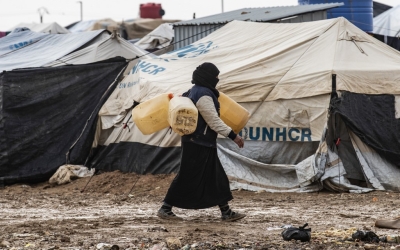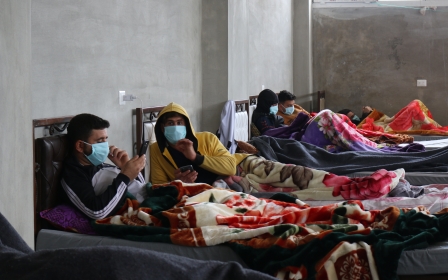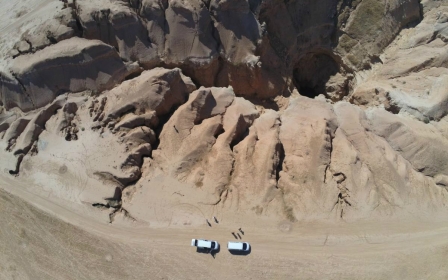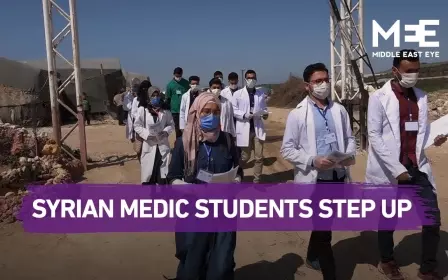No doctors or aid: Thousands of Syrian refugees at risk in Rukban camp: Amnesty

Thousands of refugees along Syria's border with Jordan are at risk of contracting the coronavirus and other diseases because of a lack of basic medical care and sanitation, Amnesty International warned.
Located in a no-man's land along the Syria-Jordan border, the Rukban camp, also known as "the Berm", is home to at least 10,000 people in dire need, Amnesty said on Thursday.
A UN-run medical centre that had been providing essential treatment for refugees in the camp has been closed since mid-March amid the the coronavirus pandemic, leaving thousands of people with only one small medical centre available for basic health care.
"The one medical centre remaining in the berm is simply not equipped for emergency care or specialised treatment," said Lynn Maalouf, Amnesty International's Middle East research director.
'While the Jordanian authorities are right in seeking to protect the population living in Jordan from Covid-19, they must not put others’ lives at risk while doing so'
- Lynn Maalouf, Amnesty International’s Middle East Research Director
The medical centre has a few nurses and one midwife, but no doctors, the rights group said.
New MEE newsletter: Jerusalem Dispatch
Sign up to get the latest insights and analysis on Israel-Palestine, alongside Turkey Unpacked and other MEE newsletters
No humanitarian convoys have been allowed into the area by the Syrian government since September 2019, and Jordan has refused to allow convoys to cross into the area from its border.
With no access to sanitisation or other supplies to protect against the spread of Covid-19, living conditions are "desperate", Amnesty said.
In a plea to the Jordanian government, Amnesty said those seeking medical treatment must be allowed to access facilities in Jordan. The group also called on Jordan to allow humanitarian aid and essential services to reach the area.
"While the Jordanian authorities are right in seeking to protect the population living in Jordan from Covid-19, they must not put others’ lives at risk while doing so,” Maalouf said.
Jordan says no
Still, Jordanian authorities have repeatedly refused such calls. On 20 April, the country announced that Foreign Minister Ayman Safadi told the UN's special envoy to Syria that Jordan would not allow the entry of humanitarian aid to the Rukban camp "for any reason."
"Jordan will neither allow the entry of aid to the Rukban camp via its territory nor the passage of persons from the camp to the kingdom," Safadi said.
"Protecting the Jordanian citizens from the coronavirus pandemic is the utmost priority.”
Jordan already hosts about 650,000 Syrian refugees, which amounts to 10 percent of its population. It has implemented some of the Middle East's strictest coronavirus regulations, completely closing its borders, in many cases to its own citizens.
Last month, Najat Rochdi, senior humanitarian adviser to the UN's Special Envoy in Syria, stressed that the delivery of humanitarian assistance including food, health and hygiene supplies to Rukban was essential. He also called for an immediate and unhindered health assessment mission to be deployed there.
In its report on Thursday, Amnesty said it is particularly concerned by the lack of maternal health care at the border camp, which has caused pregnant mothers to take dangerous journeys that often end in family separation.
"Pregnant women and other patients in urgent need of care have nowhere to turn," Maalouf said.
She said that amid the severe lack of medical services, pregnant women in need of special treatment, including caesarean sections, are being forced to travel to give birth in territory controlled by the Syrian government. These women are then prevented by Syrian security forces from returning to their families in the camp.
“People in the berm have been lacking food, drinkable water and medicines for more than four years, and increasingly so in the past two years. Both the Syrian and Jordanian governments must urgently ensure unfettered access to humanitarian aid,” Maalouf said.
Middle East Eye delivers independent and unrivalled coverage and analysis of the Middle East, North Africa and beyond. To learn more about republishing this content and the associated fees, please fill out this form. More about MEE can be found here.





